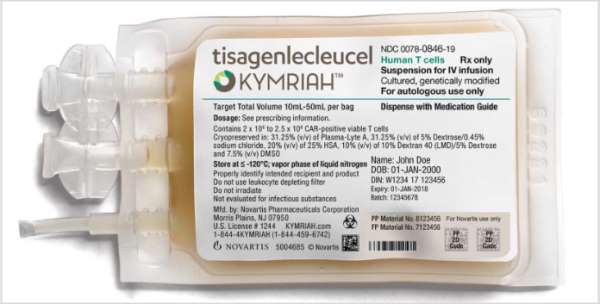Novartis' Kymriah okayed for funding in Scotland for lymphoma

Novartis’ Kymriah has become the first CAR-T available to NHS patients across the UK after Scotland’s medicines cost-effectiveness body recommended funding in an aggressive form of lymphoma.
The Scottish Medicines Consortium (SMC) said Kymriah (tisagenlecleucel) could be funded in adults with diffuse B cell lymphoma (DLBCL), who relapsed or failed to respond after two previous lines of treatment.
If left untreated people with this type of disease would have a median life expectancy of around six months.
The SMC’s decision came a year after Kymriah’s approval by the European Medicines Agency, and the simultaneous announcement that it would be the first CAR-T available on the NHS in England in its other acute lymphocytic leukaemia indication.
The SMC is also reviewing Kymriah in its other indication, and Gilead’s rival CAR-T Yescarta (axicabtagene ciloleucel) is not yet recommended for funding by NHS Scotland.
However the SMC is reviewing Yescarta in DLBCL and primary mediastinal large B-cell lymphoma (PMBCL), after two or more lines of systemic therapy.
Both drugs are available on the NHS south of the border in their approved uses under various different funding arrangements.
PACE process
The SMC considered Kymriah through its Patient and Clinical Engagement (PACE) process, used for medicines to treat end of life and very rare conditions.
At a specially convened PACE meeting patients and clinicians said that there is a very poor prognosis at this stage of the condition.
Current treatment options are limited and the condition has an emotional impact on patients and carers, on top of the burden of symptoms, the SMC noted.
A one-off cell therapy derived from a patient’s own T-cells, Kymriah could offer a lifesaving option, with the possibility of a long-term response, the SMC said.
The Kymriah decision came in a round of monthly funding decisions for recently approved medicines from the SMC.
It also recommended funding for Merck & Co’s Keytruda (pembrolizumab) in squamous non-small cell lung cancer, while Pfizer’s Vizimpro (dacomitinib) was recommended in advanced NSCLC with EGFR mutations.
However the SMC rejected funding for AstraZeneca’s Tagrisso (osimertinib) in the same indication, citing uncertainties about its benefits in relation to its cost.
The SMC did accept AZ’s Forxiga (dapagliflozin) for type 1 diabetes in combination with insulin, and Shionogi’s Senshio (ospemifene) for vulvovaginal atrophy in postmenopausal women.
However RAD Neurim Pharmaceuticals’ Slenyto (melatonin) should not be funded for insomnia in children with autism spectrum disorder and/or the rare neurogenetic disorder Smith-Magenis syndrome, the SMC said.











